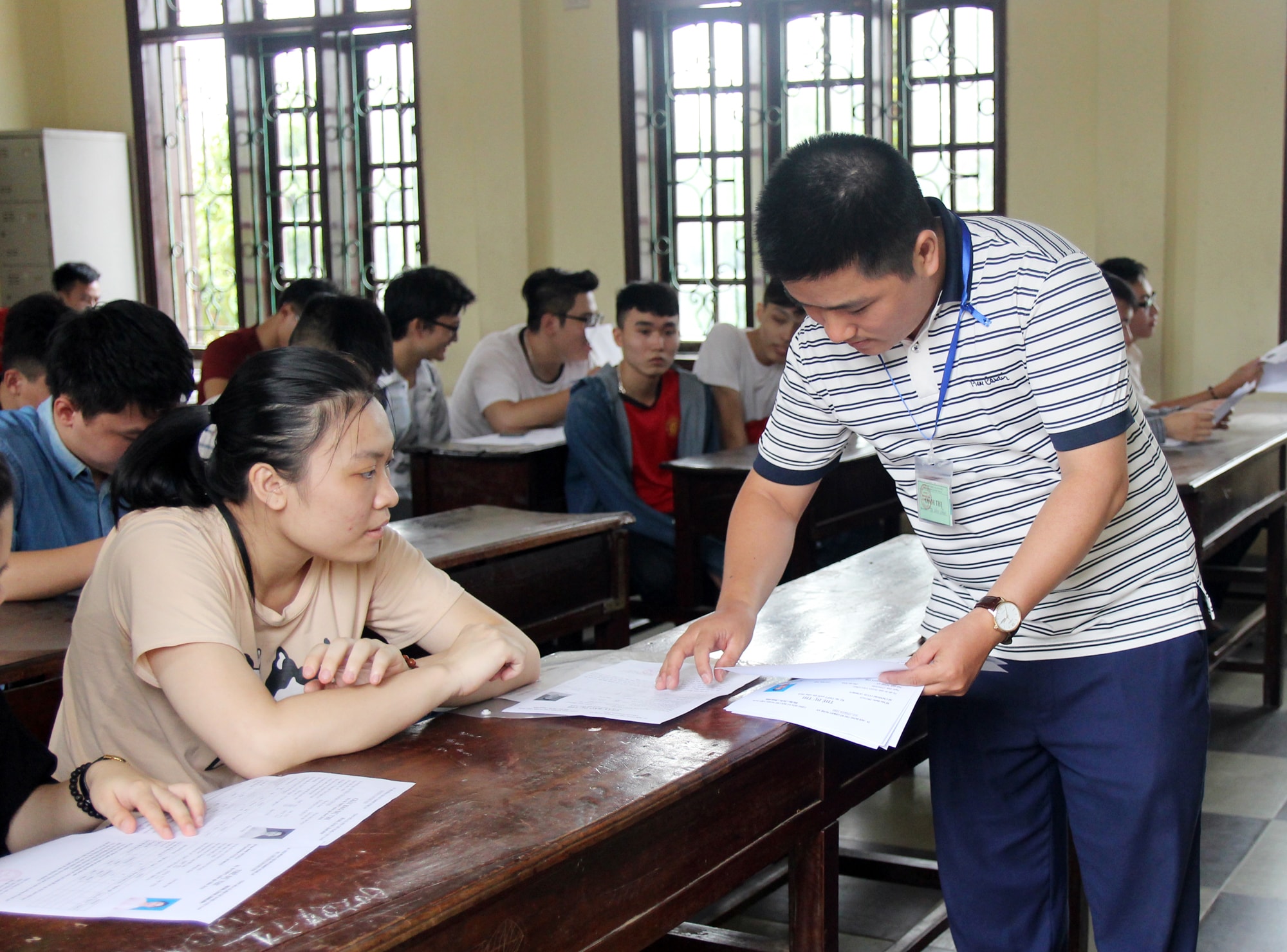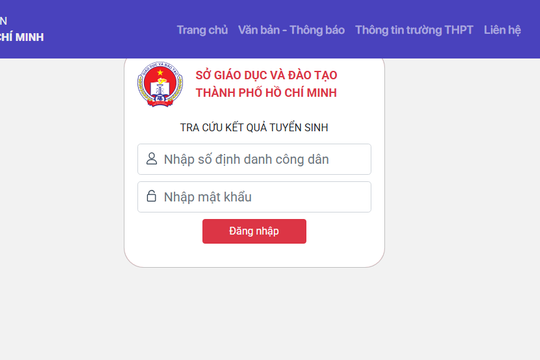How will the upcoming national high school exam change?
On July 30, in Hanoi, a meeting took place between Deputy Prime Minister Vu Duc Dam, Minister of Education and Training Phung Xuan Nha and a number of teachers, people interested in education, and university leaders.
The seminar was attended by Prof. Phan Thanh Binh - Chairman of the National Assembly's Committee on Culture, Education, Youth and Children; President of the Vietnam Association for Promoting Education Nguyen Thi Doan, leaders of Departments and Divisions under the Ministry of Education and Training, leaders of a number of universities... In addition, there were also Prof. Nguyen Minh Thuyet, Prof. Pham Tat Dong, Prof. Nguyen Lan Dung, Nguyen Thi Doan, Dr. Le Thong Nhat, Dr. Nguyen Tung Lam...
At the beginning of the discussion, a report on graduation exams in countries such as China, Korea, UK, etc. as well as a summary of exam and admission methods from the 1970s onwards was introduced.
Through this summary, it can be seen that each option has different advantages and disadvantages.
 |
| Instructions for candidates to correct mistakes in the 2018 National High School Exam. Photo: My Ha |
This year's exam: Not suitable
Many experts shared that this was not a conference meeting, and no conclusions were given. Deputy Prime Minister Vu Duc Dam and Minister Phung Xuan Nha listened with an open mind.
"I appreciate the listening and receptive spirit of the Minister of Education and Training, although there were some opinions in this meeting that were not easy to hear at all."– Mr. Quach Tuan Ngoc, former Director of the Department of Information Technology, Ministry of Education and Training shared.
The main issues discussed and commented by experts revolved around the national high school exam: exam questions, invigilation and grading, software, human factors, etc.
Opinions were given that: The exam questions were assessed as unstable between years, there was a lack of test takers, and they needed to be more suitable to the goal of assessing learning outcomes in high school; the graduation assessment method including the transcript score was unreasonable...
In his final speech of the day after listening to opinions and responding to comments on the exam questions, Minister Phung Xuan Nha also admitted that this year's exam questions were "not suitable".
Proposal: Mark in clusters, test supervisors send image files to the Ministry
In addition, multiple choice test scoring software is also shown to have many loopholes, for example, in the conversion from image files to text files.
At the meeting, there were some proposed solutions such as: Before candidates submit their papers, they need to re-color them with ink pen to avoid erasing later, the university's exam invigilator needs to stay longer to scan the papers and send them to the Ministry to be considered to have completed the task, scan the entire essay test of Literature...
In the marking stage, opinions suggested marking in clusters and cross-marking.
Regarding the multiple-choice test, many delegates said that this test also needs to be done and graded. At the same time, after the candidates have finished the test, they will be sealed and sent to a centralized grading center supervised by the Ministry of Education and Training. That is, the Ministry can organize 3-4 grading clusters in Hanoi, Ho Chi Minh City, Da Nang, etc.
Because the machine marking will be done very quickly, the Ministry's staff will be in charge of these marking points. Machine marking does not require the mobilization of local people. Some specialized staff from high school or university can be mobilized to mark.
Regarding the idea that universities should be assigned to preside over the examination and grading, Professor Nguyen Minh Thuyet said that it should not be done because it is clear that this is not a university entrance exam, so it cannot be assigned to universities, but must be assigned to the provinces. However, according to him, it is necessary to review the examination regulations and technical factors.
In the face of exam cheating scandals in Ha Giang and Son La during the recent exam season, the panelists agreed on the following point of view: the most important factor is still the human factor. Whether the exam is reliable or not, whether it is serious or not still depends on the human factor.
Therefore, responsibility must be clearly assigned to individuals and localities organizing and supervising, and the Ministry of Education and Training cannot "reach out to each and every inch" - Dr. Ngoc said. Specifically, the person with the highest responsibility should be the Head of the local exam steering committee - that is, the Vice Chairman of the People's Committee of the province or city, not just the Department of Education and Training.
Most experts agree with the direction of changing the way questions are set so that the results of this exam can be used to consider high school graduation, without having to add up the transcript points. However, there are also opinions that the exam results should only be a part, not absolutely based on one factor.
Agree to keep the national high school exam
Regarding universities, Associate Professor Hoang Minh Son - Principal of Hanoi University of Science and Technology said that although there are still some different opinions, the majority agreed that the organization of the current national high school exam needs to be extended for a few more years with some improvements to improve the reliability and honesty of the exam to better suit the two main purposes of assessing general education results and considering high school graduation.
“In addition to the graduation purpose, the exam also has another important purpose which is to evaluate the teaching and learning results of each school and each locality on a national scale to have common standards, and to have an impact on the teaching and learning process,” Mr. Son commented.
According to this principal, when we see the technical loopholes, the solution is not difficult, but the most important factor is still the human factor. Therefore, it is necessary to assign responsibilities more clearly and bind the participants more closely.
Dr. Quach Tuan Ngoc said that although pointing out many shortcomings and suggestions for the exam, delegates also acknowledged its advantages.
“Firstly, the exam has avoided costs to the maximum. The second advantage is that the technology system allows candidates to register unlimited wishes. The software runs smoothly, is completely automatic and there is no longer a phenomenon of fake candidates. Those are the advantages to overcome previous years,” said Dr. Ngoc.
In general, most experts agree that the national high school exam needs to be kept, but it needs to be improved and adjusted, not wavered because of the negative events in Ha Giang and Son La.
Dr. Nguyen Tung Lam - Principal of Dinh Tien Hoang High School - Chairman of the Hanoi Educational Psychology Association said: "There are also opinions that universities must innovate in enrollment because it affects teaching and learning in high school a lot. We must stop selecting students based on the A, B, C, D combination, and instead set other standards to encourage students to study. Or each profession requires specific skills, so the requirements of that profession must be clarified. It is unreasonable to just focus on the exam block alone."
Second, we must clarify the role of learners. “Currently, we keep blaming the exams but do not talk about the learners. If learners are not responsible, proactive, and self-disciplined, they cannot do anything,” Dr. Lam said.
An exam that guarantees both goals is "impossible"
Regarding previous comments and controversies that the exam cannot meet the two goals of graduation and university and college admission, Dr. Ngoc emphasized: “The discussion unanimously agreed that this is not a 2-in-1 exam as it has long been called, but rather a national high school graduation exam. Therefore, it is impossible to ensure both university admission goals. If the exam is serious and reliable, schools can use the results for admission, but do not set a goal for schools to use those scores for university admission. Whether schools use them or not is up to them.”
Professor Nguyen Minh Thuyet also contributed his opinion in the discussion: “In the immediate future, in my opinion, it is necessary to continue organizing the national high school exam as it is now, following the previous direction of the Deputy Prime Minister and the Minister, to stabilize this exam until the end of 2020.
But it is necessary to clarify the nature of the exam. The nature of this exam is high school graduation without the additional goal of university admission. If the goal is determined like that, the exam will also be easy, the exam also does not need to try to classify too much for admission purposes but only at the level of testing knowledge and skills in general.
Universities can rely on and consider this as one of the bases for admission. Some schools rely on the results of this exam, but others organize additional exams or have some form of assessment, depending on the schools.
Delegates attending the meeting said that the spirit of the discussion was to exchange and listen, and specific changes and improvements for next year's exams will be discussed in more detail.
“In the long term, I think the high school graduation exam should be assigned to high schools to consider and issue certificates of program completion, and maybe even issue high school graduation certificates. Only then can we accurately assess the learning process of students and apply active teaching methods, which means giving students a lot of practice. If we continue to take centralized exams like now, the questions will still be testing knowledge and problem-solving skills. And teachers will not have to send students to field trips or practice, but just cram knowledge and problem-solving skills. If we improve like this, it will support the new general education program.
However, there is also concern that giving it to schools will cause the disease of achievement, but I think there is no concern. Because the graduation results of the school are not valuable for university admission except for schools that only consider admission. The remaining prestigious universities will organize entrance exams. If the graduation rate is high but the percentage of students from the school entering prestigious universities is low, then the disease of achievement will gradually be revealed. The people and the government will not agree and then the schools will have to change.
However, there is something that I myself have not yet found an answer to: if so, with the general diplomas issued by schools, can we negotiate to have our diplomas recognized by other countries?
When universities are given this authority, there may be problems with exam preparation, and candidates will have to travel far. Every method has its difficulties, but I think there is a solution to this problem. To avoid students having to travel far, universities can cooperate with each other to organize exams and use common results. Now every province has universities, so central universities can cooperate with local schools to organize exams right in the locality.
- Professor Nguyen Minh Thuyet, Editor-in-Chief of the new general education program.


.png)
.png)




